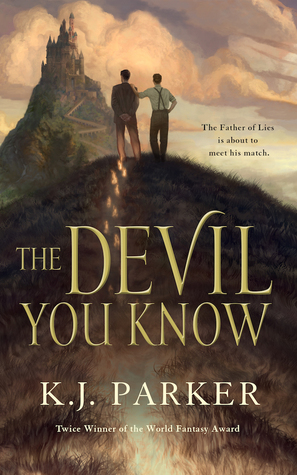“I don’t do evil when I’m not on duty, just as prostitutes tend not to have sex on their days off.”
So begins KJ Parker’s new novella, The Devil You Know, a fantasy story featuring a philosopher who decides to sell his soul to a devil after making a career writing treatises on the non-existence of the supernatural. Sound counterintuitive, slightly perverse, and maybe a little funny?
Welcome to KJ Parker.
KJ Parker’s real identity was a closely-guarded secret in the fantasy world until last year, when the power behind the throne was revealed to be humorist and historical fiction writer Tom Holt. Has revealing Parker’s identity changed his fiction? Parker has always been funny, but this is the funniest Parker story I’ve read so far; perhaps a sign that the two identities are beginning to merge.
The Devil You Know alternates between two perspectives: Saloninus, the self-proclaimed “greatest philosopher, the wisest man that ever lived,” who is getting old and wants to live forever; and an unnamed devil who is both deliverer of the infernal contract and Saloninus’s servant once it is signed — who also happens to be Saloninus’s biggest fan.
The rest of the novella covers the battle of wits between these two protagonists, told over several years with an epic sweep it’s uncommon to find in a short work. The balance of power between them lurches unexpectedly, teetering from one side to the other in mere moments. The interplay between the two characters is fascinating, and Parker mines great humour from his dual perspectives, cutting sharply from one to another to see how they are secretly undercutting and second-guessing each other. The writing is sharp and eminently quotable, although sometimes the two characters blur together so it’s hard to tell whose perspective you’re following – but perhaps that’s the point.
Like all of Parker’s books, The Devil You Know dabbles in philosophy and some dark social commentary. In spite of using his writing to rise to a position of authority, Saloninus is quick to declare, “I write stuff, I don’t necessarily believe it myself,” a knowing wink to those who will say anything for power. The devil has a fairly cynical view of humanity, as you might expect, saying, “When a mortal looks in the glass, he never really sees what’s there,” casting us a species that is constantly engaged in self-deception and justification. There are dozens of great lines on the nature of human relationships, desires, and motivations that made me pause and think. Mostly these are quite cynical; Parker’s work may lack the explicit sex and gore associated with grimdark fantasy, but his consistently dim view of humanity places him, in my eyes, as one of the leading lights of the genre.

I especially enjoyed Parker’s portrayal of Hell as a labyrinthine, baroque, and rather ineffective bureaucracy. It’s not the most original idea, (“We have the best lawyers,” the devil says), but the casual indifference of Hell’s systems strikes a nice satirical blow. The devils themselves are interesting in that they fear alchemy, because of its capacity for creation (and in fact are unable to create any kind of art or culture for themselves). Parker seems to be suggesting that religious thought thrives best when ideas are left unchallenged.
The Devil You Know isn’t for everyone – it is a little heavy on the exposition and light on finely-focused detail, due to telling a sweeping story in novella format, and it doesn’t answer all of the questions it poses. But the way it highlights the humour and removes a lot of the highly-detailed technical explanations that Parker is also known for make it an excellent starting point for his work. It’s also a must-read for Parker diehards, giving definitive proof that many of the diverse locations his stories have been set in are, as long suspected, in the same world. Anyone with a dark disposition who wants some black humour and philosophical pondering alongside their fantasy could do far worse than to check out The Devil You Know.